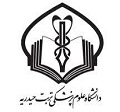(2019) A systematic review and meta-analysis of the genetic characterization of human echinococcosis in Iran, an endemic country. Epidemiol Health. e2019024. ISSN 2092-7193 (Electronic) 2092-7193 (Linking)
|
Text
epih-41-e2019024.pdf Download (1MB) | Preview |
Abstract
Human echinococcosis is an infectious disease caused by tapeworms belonging to the species Echinococcus. This parasite has a worldwide distribution and is considered a neglected tropical disease by the World Health Organization. Due to the diversity of Echinococcus spp. hosts, as well as variation in geographical, climatic, and socio-ethnic conditions, the question of the strains or genotypes of Echinococcus spp. that are involved in human infections is important. The aim of this study was to provide a summary of the available data on genotypes of Echinococcus obtained from the Iranian population. Four international databases (PubMed, Scopus, Science Direct, and Web of Science) and 4 Persian databases (Magiran, Scientific Information Database, Iran Medex, and IranDoc) were searched for cross-sectional studies that reported the genotypes of Echinococcus spp. in human echinococcosis cases using molecular methods in Iran through July 2018. The Newcastle-Ottawa Scale was used to assess the quality of the selected studies. A total of 559 cases of human cystic echinococcosis were reported in the 21 included articles. The majority of cases belonged to genotype G1 (89.2; 95 confidence interval CI, 80.1 to 95.8), genotype G6 (8.2%; 95% CI, 2.8 to 15.9), and genotype G3 (2.3%; 95% CI, 1.1 to 3.9). Since genotype G1 of Echinococcus appears to be the most prevalent genotype affecting humans in Iran, disease control initiatives aimed at sheep intermediate hosts may be the most beneficial. In addition, educational programs and serological screening in individuals may help reduce the national impact of the disease.
| Item Type: | Article |
|---|---|
| Keywords: | Cystic echinococcosis; Genotype; Human; Iran; Meta-analysis; Systematic review |
| Page Range: | e2019024 |
| Journal or Publication Title: | Epidemiol Health |
| Journal Index: | ISI, Pubmed, Scopus |
| Volume: | 41 |
| Identification Number: | 10.4178/epih.e2019024 |
| ISSN: | 2092-7193 (Electronic) 2092-7193 (Linking) |
| Depositing User: | دکتر محبوبه عبداللهی |
| URI: | http://eprints.thums.ac.ir/id/eprint/1331 |
Actions (login required)
 |
View Item |



